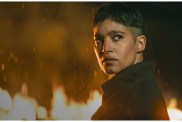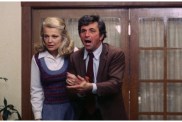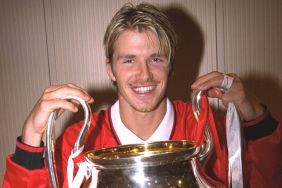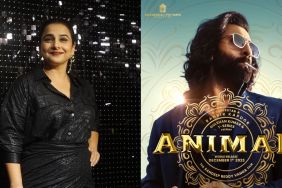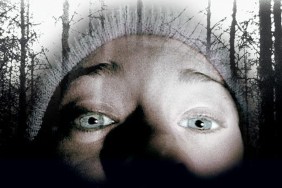Filmmaker Azazel Jacobs, a mainstay at the Sundance Film Festival for a number of years, brought his most recent movie Terri there earlier this year. It’s a coming-of-age comedy starring newcomer Jacob Wysocki as the title character, an overweight teenager who goes to school wearing pajamas and has an affinity for wildlife and home economics, the latter where he befriends a pretty girl named Heather (Olivia Crocicchia) who has had a fall from grace.
Having already established himself as an actor who can steal scenes with his eccentric characters, John C. Reilly plays Mr. Fitzgerald, the vice-principal at Terri’s school who takes an unwelcome interest in the teenager’s life, feeling he can help him overcome his problems adjusting. As strange as Terri may behave on his own, the movie gets even funnier and stranger when Mr. Fitzgerald gets involved, and then even moreso when one of the school’s other outcasts, a crazy kid named Chad (Bridger Zadina), inserts himself into Terri’s life.
Terri is a comedy in the vein of other Sundance favorites like Napoleon Dynamite, though Jacobs takes a far more subdued approach to the humor, allowing the story to go into all sorts of odd and often uncomfortable places in order to get laughs.
ComingSoon.net sat down with Jacobs and Reilly a couple of weeks back, and just like in the movie, things got a little weird. At first, Reilly seemed a bit tight-lipped, not really wanting to answer many questions, then he opened up in a big way, and by the end of the interview, he was lying down on the couch acting as if he was in therapy. Jacobs remained undaunted, sporting a cool Big Audio Dynamite T-shirt, which he told us later he got from Don Letts himself.
ComingSoon.net: It’s been a while since I’ve seen “Momma’s Man” but there definitely seems to be a throughline between the two movies, like you have an affinity for dysfunctional characters in some ways? Do you see that?
Azazel Jacobs: I think that stories generally have an affinity for dysfunctional characters, but there’s similarities that draw me. For sure, I wanted to tell a personal story even though it wasn’t going to be my own story this time. I feel like “Momma’s Man” came from a place and the people and characters, things that I knew very well. Afterwards, I wanted to tell somebody else’s story, but also make it personal.
CS: Did you two know each other before?
John C. Reilly: We met as a result of this project. Well, we met briefly.
Jacobs: Our first conversation was after he saw “Momma’s Man” at an earlier film festival.
CS: John, you tend to go to Sundance a lot, but this may have been the first year you weren’t there.
Reilly: Right, I was in Paris making the Polanski movie.
CS: And I guess your wife was the producer on this?
Reilly: She was one of them, yeah.
Jacobs: Alison Dickey’s her name. She’s somebody that I became in contact with after a short film that I made that won Slamdance called “Kirk and Kerry” in 1997. It was before Email and I came back with an answering machine full of messages from every studio and everybody saying, “Please send your VHS of this movie…” which was very expensive just to cut out the labels, so I sent it to everybody that asked, including this casting director Nicole Arbusto and her friend Alison who asked for it, and they were the only two that wound up responding. It was a 26-minutes experimental film, but Nicole and Allison were the only ones that wrote back this letter responding to it, and it really meant a lot to me. It was encouraging and from that point on, I wanted to work with both of them really. Each time I had a project, I brought it to Allison and see if I could get her involved, and then finally with “Terri” I could.
CS: I read that you were at the “Momma’s Man” premiere with your wife, so had you expressed interest in what Az was doing next? How did it come about that you played Mr. Fitzgerald?
Reilly: I just met him because Allison thought he was a really talented director. She’s the one who said, “We should go see this movie,” and I loved the movie, and then read the manuscript for Terri, and then the script, and it just all seemed to make sense. There’s a lot of things out there as possibilities if you just kind of wait until they kind of come to life, and this one came to life. It just so happens that my wife was one of the producers, but she wasn’t the reason I did it.
Jacobs: And I always knew it wasn’t an either or situation. Really, by that point, after that “Momma’s Man” screening, I already had the manuscript that “Terri” would become that I had already worked on.

CS: Was it a treatment?
Jacobs: It was like a character study of a bunch of different characters, one of which being Terri, and so I already had it in mind that “Alright, there could be a movie in here,” so after I spoke to them about “Momma’s Man,” I walked away and was thinking that maybe there was a chance this was the movie I could get Allison involved in, and the more I thought about it, I was like, “Well, maybe this would be the perfect role for John and then we’ll see what happens.”
CS: Am I wrong or have you never played a principal before?
Reilly: I think so. I think it’s my first vice-principal. I think it’s the first teacher in general.
CS: Do you generally look for different types of roles when you’re taking movies or was it just the character you liked or the dialogue?
Reilly: I like mentor parts, because I’m someone who likes interacting with younger people and picking their brains and I’ve always had an affinity for when I worked with younger people or younger people in my family. It’s a character I felt I understood, and the journey that he takes in this story was really interesting to me. He starts out as this really authoritative voice of adult supervision and then about halfway through the movie you realize, “This guy is faking it. He’s not sure of himself at all,” and then there’s this great breakthrough that he has with the Terri character where he admits, “Look, the world is complicated and I’m struggling as much as you are to understand it.”
CS: How much of the character was on the page and how much came from John since he has such comedic instincts?
Jacobs: The great thing was across the board, the people felt very strongly about the script. It was a really good script. The story was there, the words that Pat (Dewitt, Jacobs’ co-screenwriter) wrote were really the right words. What was nice for me for the script that it had a lot of space inside of it to breathe. Even if people were going to say these words, it took its time. It wasn’t just trying to rush from getting over from this point to this point to this point. It actually gave space where somebody with John’s skill could go in and give it some gravity and give it some weight and take the time to let this line work off another person’s line and let it change and evolve naturally.
CS: How did you go about finding the kids? The actor who plays Terri is fairly new but some of the other kids have quite a bit of experience, right?
Jacobs: Yeah, so besides being able to get Allison, I was able to get that casting director Nicole, who also wrote that letter way back when, the two of them, so Nicole Arbusto her casting partner Joy Dickson cast this film. Before even getting the financing together, we knew it was going to be very daunting just finding who these kids are. That was one of the first things we started, months earlier, and they just worked tirelessly doing a far outreach and bringing in kids and ultimately, it kind of came down to trying this Terri with this Chad and this Chad with this Heather and figuring out how people worked with each other, and ultimately, bringing John in and trying out Fitzgerald with this Terri and that Terri and seeing what combination would work best.
CS: Did you spend a lot of time developing your character before you started shooting or did that come about from interacting with the kids?
Reilly: It really started with those auditions, that’s when you start saying the words out loud for the first time. We didn’t have a big rehearsal process or anything for the movie. It was a pretty tight schedule. I felt like I kind of knew the guy. I had guidance counselors, I felt like I knew him, I knew what to do. It was just a matter of hammering it out each day on the set.
CS: Did you have to play around with how far you could take it, because Jacob being very new, I could imagine he may have been flustered…
Reilly: He was a little nervous right at the beginning, but he quickly settled down. He has a real nice quiet confidence, Jacob, and an openness to the moment. He’s not someone who is very neurotic or obsesses about things, so he had a good sense of play. Yeah, that’s what you need to be good, just be there and be present in the moment and throwing the ball back when someone throws it to you.
Jacobs: I think the credit is also to John, because John was the most experienced person on set, so I think all of us that first day had that same fears. “How is this going to work with somebody who has worked with all these directors and with the experiences he’s had?” I think very early on, it just became about work and you saw that this was just being treated like, “How can we handle each of these moments the best we can?”

CS: One of the things I really liked which I’m not sure many people will notice is Mr. Fitzgerald’s office. I don’t know who decorated it…
Jacobs: Matthew Luem, the production designer.
CS: I was curious how that came together, because it’s one of those things that if you look around, you’ll see all sorts of crazy things. Did you add anything to that yourself, John, or did you just walk in to whatever they already had in there?
Reilly: No, a lot of it was just there. They asked me a little bit beforehand what I thought might be in there. I gave some input in that way, but it was really pretty well done before I got there.
Jacobs: Yeah, and a lot of that stuff was just taken from the school and different teacher’s desks that was put in there. I still watching that movie catch little notes and post-its that are really funny.
CS: Right, there’s stuff in there you think there’s gotta be a story behind it even if it wasn’t specifically in the script.
Jacobs: I also love that when he grabs the “Yesterdays” book, it’s so accessible, yet it’s something he’s “never shown to anybody,” but literally it’s at arm’s length.
CS: What about working with the kids developing their characters? I haven’t met Jacob so I have no idea how much he’s like Terri or whether Bridger Zadina is like Chad.
Jacobs: They’re all were different. That’s the thing. My approach to each of these characters–who John is, who Jacob is, who Bridger played–they’re all very different in the way that I felt best to talk to them, and they all got shaped as we were making the movie. I mean, Bridger couldn’t be farther away from Chad. He’s a very trained actor and a very serious person, to the point that it was just jarring that after I called “cut,” he’d call me aside and say, “Az, I have a question about this part.” It would be very hard to reconcile the two people, but with Jacob, he walked into the audition with something that I really wanted for Terri that I didn’t know if I’d be able to direct, which was a type of confidence that I think Terri needed to be able to go to school in pajamas each day and leading the life that he was.
CS: You weren’t at Sundance so you missed it, John, but both your character in this and in “Cedar Rapids” absolutely killed the audience at the Eccles every time. I know you come from a serious dramatic background, but…
Reilly: Well… sort of. I mean, I did a ton of musicals when I was a kid. I actually started out doing musicals, that’s the truth of it. But early on in movies, it was a lot of dramatic movies.
CS: I was curious what you drew from to be able to deliver these lines in a way that just cracks people up. Is that just from experimenting on how to say them?
Reilly: You mean “Cool Breeze Club, members only”?
CS: Exactly like that! Anybody else could say that line and it would be “Whatever” but the way you say it, it just kills audiences. Is that just from experience knowing how to say a line for the best effect?
Reilly: I don’t know. You just do the best you can, try and be honest as you can, and be as committed to the character’s point of view as you can. Don’t try to wink or feel like you’re smarter than or you’re somehow above your character. Really inhabit them and believe what they believe then it just comes out that way I guess, I don’t know. I don’t do too much analysis. What we’re doing right now is about as into my own working as I get. I just try to stay not too analytical about it, just throw it out.
Jacobs: But it was a really nice feeling to feel people laugh in those moments. As a person sitting in a room watching it backwards and forwards every day and then suddenly having an audience. With my other films, there’s things in there that I thought were funny, and if people laughed, I liked it, and if they didn’t laugh, that was okay and it didn’t necessarily mean it wasn’t working. I liked having an instant sign hearing if things worked with each other and sometimes working better than I could have imagined.
Reilly: There’s a lot of different laughter, too. People laugh for different reasons. There’s actually a wide range of why people laugh at things. Sometimes it’s recognition that something is true, you know?
Jacobs: Sometimes the shed scene will play completely dead quiet and sometimes, you’ll hear laughter that you know somebody is starting to get really uncomfortable to the point of laughing.
CS: There’s discomfort but then there’s also the people who think “Well, I’ve had the same kind of night in my teen years when I got drunk and…” (This is where it starts to get weird.)
Reilly: Got fingered in the shed?
CS: Not exactly one of those nights, and I never peed on my own pants.
Reilly: I just want to say for the record, that there was a total incident in my neighborhood where someone I knew very well was allegedly fingered in a garage behind…
Jacobs: How well did you know this person?
Reilly: They were related to me.
CS: Are you sure you want this on the record?
Reilly: No, it’s on the record. It is what it is. So and so was fingered in the garage and it spread like wildfire. Every single kid of a certain age in my neighborhood knew it.

CS: That statement is going to seem very random for anyone reading this interview without having seen the movie because I haven’t actually asked about that scene.
Jacobs: But that’s what happens and this is what you talk about in school.
CS: Going back to the scenes with John in the office, it must be tough to keep the crew from laughing. Was this one of those movies where it’s dead silent on set and then when you call “Cut” everyone is laughing?
Jacobs: Well, no. Definitely in the office, that room was so small that very few people could be in there, so most of the crew is going to be outside that room. Everybody was very professional on this set. Everyone was having a good time but it never felt like a party. I got the sense that people were enjoying what they were making, but it was the sense that this was just fun times. There are still things to do next and the time schedule was…
Reilly: Yeah, it was a tight schedule with a lot to do.
Jacobs: The hawk scene, on the other side, people flipped out. When that hawk swooped in and ate the mice, and I called “Cut,” we all went crazy. That was the one time where everybody was like “Woah, did you just see that?” We all had the same reaction that Terri did because we couldn’t believe what we just saw.
CS: I assume you had a wrangler who could get the hawk to do that.
Jacobs: Yeah, we had a wrangler and we read it on the page and you saw exactly what’s supposed to happen, but seeing it happen, seeing the hawk eat one after another.
CS: Has the movie changed at all since Sundance?
Jacobs: No, now you’re just seeing a print of it. We still didn’t have a print yet and we were showing on HD.
CS: You both have been around the Sundance scene for some time, and there have been a lot of coming-of-age movies that have played there, since that’s a common theme that seems to run through Sundance.
Jacobs: The things that run through life. It’s what we all… major, major occurrences happen, so stories have been told about it forever and will be.
CS: But a lot of them are very mainstream, so do you feel like you’re very much on the edge of the types of movies like this that play at Sundance? For example, “The Art of Getting By” which just came out.
Jacobs: Yeah, I didn’t get to see that. I think of the coming-of-age stories that influenced me, I think “Clueless” is very cutting edge. I think “Clueless” is fantastic. I think “The Wanderers” is a coming-of-age story. I think even “The Breakfast Club,” I think any of the ones that have lasted with me have pushed it in a new direction.
Reilly: “Risky Business.” I loved “Risky Business.” I fantasized about having sex with a woman on a train after that.
CS: I think everyone did after that movie. So where do you go from here? Do you have any ideas what you might want to do next?
Jacobs: I have a few different ideas, but I know I want to make, just like this was to “Momma’s Man,” I know I want to make a film that’s very different, and something unexpected. These movies take a while to put together, and I have to live with them for a long time so I want to make sure I’m in some kind of new inspiring world.
(At this point, John has decided to turn the interview into a therapy session and has lied down on the couch.)
CS: John, I kind of feel like I should ask you about your mother rather than asking about your next project.
Reilly: My mother? (to Azazel) I have an idea for you, but I’ll tell you later.
CS: You’ve done this string of comedies and I imagine “Carnage” might have comedic elements but that isn’t a comedy.
Reilly: It’s pretty funny. It’s a dark comedy.
CS: But “We Need to Talk about Kevin,” which was at Cannes, is a drama, so are you trying to go back in that direction?
Reilly: Yeah, I’m just trying to keep people guessing so they don’t know what to expect when they see me in a movie. I think that’s a really important part of an actor’s arsenal is the element of surprise. If people sit down in a theater and they can guess what you do before you open your mouth, that’s not a good thing I don’t think, for me anyway.
CS: That’s true. So do you have any idea what you want to do next? Or will I have to wait until it’s in theaters to know that you’re in your next movie?
Reilly: Yeah, I have a few things coming out, and I usually try to take the summer off to be with my family, so I’ll get ambitious again in the fall probably.
Terri opens in New York and L.A. on Friday.
